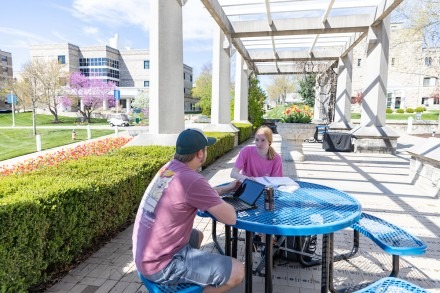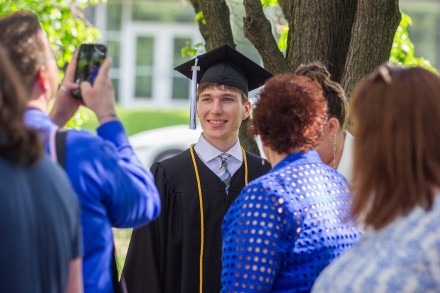Rockhurst University’s Speech-Language Pathology (SLP) undergraduate degree is a pre-professional speech-language pathology program that prepares you to serve children and adults with a broad range of communication disorders. If you’re wondering how to become a speech pathologist, RU’s acclaimed SLP major is the best place to start.


Program Overview
With a foundation in Jesuit, liberal arts education, our communication science program emphasizes an ethical and culturally sensitive approach to its speech therapy curriculum. Our speech-language pathology degree consists of 56 credit hours and includes courses in human communication disorders, culture and diversity, and speech and hearing science.
This degree is an excellent option for students interested in pursuing a graduate degree to become a speech pathologist, or further specialize their communication science expertise with a graduate degree in audiology or speech and hearing science. The University also offers a communication sciences and disorders minor.
Freshmen are eligible to apply for pre-admission to the Master of Science in Speech-Language Pathology.
Learning Outcomes
- Understanding of normal human communication and swallowing processes.
- Ability to identify and describe the etiologies and characteristics of communication and swallowing disorders.
- Demonstrate an understanding of multicultural sensitivity as it relates to the discipline of speech-language pathology.
- Apply effective oral and written communication skills in all academic settings.
Program Outcomes
What speech-language pathology jobs are available to you post-graduation?
Rockhurst SLP graduates are prepared for their professional roles in the field. Speech pathology jobs can be lucrative and self-fulfilling. And you’ll be happy to know the SLP industry is growing much faster than average, meaning your skills will be in high demand.
Speech Pathologist
Speech Pathology Assistant
Audiologist
Speech Therapist
Early Intervention Specialist
Early Childhood Education
School Counselor
Child Life Specialist
Course Map
Degree and class descriptions and requirements can be found by clicking on the course catalog listings below:
Popular Courses
This course will provide an overview of normal and disordered communication across the lifespan. Topics will include a basic introduction to speech-language pathology and audiology, anatomy and physiology of the speech and hearing mechanism, normal development of communication and swallowing, and characteristics of communication disorders in adults and children.
This course will provide an overview of the anatomical structures that support the communication and swallowing processes. The physiology and interconnections of the respiration, phonation, articulation, resonation, neurology, hearing, and mastication/deglutition systems will be examined.
This course will examine the etiologies, characteristics, assessment, and intervention principles for pediatric clients with speech, language, and/or swallowing disorders. Evidence-based practice across assessment and intervention strategies for this population will be emphasized.
This course will provide an overview of physics and psychoacoustics of speech and hearing. Communication processes will be considered in relation to both speech production and speech signal perception and processing. Theory, measurement and instrumentation in studying normal aspects of speech production and perception will be included.
Degree Info
- Observe speech-language pathologists and audiologists at work in the community
- Collaborate with faculty on communication sciences and disorders research projects
- Participate in service projects working with individuals with communication disorders
- Participate in the undergraduate PURPOSE Club with other health science majors
- Shadow faculty at collaborative sites such as local Catholic schools and community centers
Find Your Program
Choose topic to quickly find specific program details
